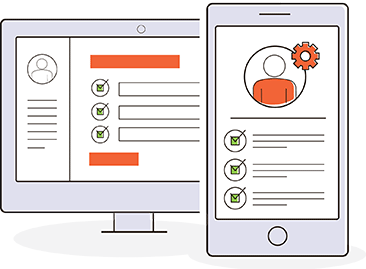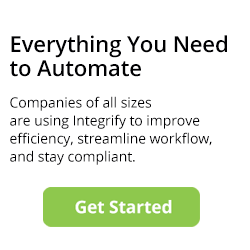Enterprise Workflow Automation
Enterprise Automation: Modernize your organization for increased productivity and efficiency.

Enterprise automation can sound like a massive undertaking, and it certainly can be. However, many companies have taken the strategic approach of biting off smaller, departmental (and even sub-departmental) automation projects while focusing on the larger goal of a fully-automated enterprise. Many of these projects fall under the broader framework of "Digital Transformation."
What do we mean by "an automated enterprise?"
Enterprise automation is the systematic review of an organization's processes to ensure optimal performance while looking for manual processes that can be replaced with intelligent digital alternatives.
While "digital transformation" has become a buzzword for modern businesses, the idea of automating manual business tasks to achieve greater efficiency has been around for many years. Companies that focus on business process automation achieve greater profits, are more competitive, have lower customer turnover, and offer a better employee experience.
Why Focus on Enterprise Automation?
By automating an organization's processes, especially those processes that have traditionally been handled manually, significant improvements can be made in:
Efficiency
Streamline and speed up internal processes by reducing manual entry and request handling.
Productivity
Identify performance trends and bottlenecks and take action to improve output.
Audibility and Accountability
Provide verifiable evidence that a sequence of tasks or activities has been performed as expected and address exceptions.
Job Satisfaction
Eliminate tedious, rote work so employees can focus on higher-value, more rewarding activities.
Accuracy
Reduce errors by eliminating manual data entry, adding checkpoints, and running compliance audits.
Additional Benefits
- Policy compliance adherence
- Reduced approval cycles
- Reduced manual handling
- Improved visibility
- Improved employee satisfaction
- Continual process improvement
- Better workload management
- Reduced errors
Examples of Enterprise Processes to Automate
An automated enterprise doesn't send emails and Excel spreadsheets around, they build smart, automated workflow automation software to automate critical, everyday processes. You can review the examples below or download our Use Case Examples PDF.
| IT/IS
IS Service Requests Security Access Requests New Account Setup Change Requests New Project Requests Security Incidents Finance Expense Approvals Salary/Wage Changes Marketing Campaign Approvals Brand Management |
Facilities
Office Relocations Resource Scheduling Facility Access Move Requests Sales Quote Approvals Proposal Approvals Product Discounts Legal Legal Holds |
HR
Benefits Changes Timesheets Employee Onboarding Employee Offboarding Vacation Requests Purchasing General Procurement Capital Approvals Invoice Approvals Product Pricing |
Automation Vendors: Not One Size Fits All
Companies like Kissflow, Pipefy, Process.St, etc., provide simple automation tools for small businesses, while Integrify, Appian, and Nintex provide more robust tools for mid-size and enterprise companies. In addition, some existing vendors in other categories like SalesForce, Oracle, SAP, Smartsheets, Monday.com, and Microsoft give some add-on automation as part of their products. Workflow automation is a large and fragmented market.
When choosing an automation vendor, it's easy to get consumed by shiny features like Artificial Intelligence, RPA (more on RPA below), IoT, and a variety of other flashy features. At the end of the day, though, you need to marry the platform with your actual needs rather than what a vendor wants to upsell you on.
The Integrify Difference: Scalability and Focus
SMB and Enterprise automation software differ in feature set, interoperability, scalability, and service/implementation component. The difference between an add-on to an existing enterprise suite and Integrify is that we are focused entirely on workflow automation for the enterprise, not ERP, CRM, Accounting, etc. We provide a best-of-breed workflow automation platform that connects to these other tools and makes them better while providing our customers with all the features, stability, and scalability needed for enterprise workflow automation.
Where Does Robotic Process Automation (RPA) Fit?
Workflow automation and robotic process automation (RPA) are separate but compatible technologies. Workflow automation tools like Integrify allow your enterprise to automate a series of tasks that are performed by individuals or machines, whereas RPA digs deeper into a specific type of task performed as part of a workflow. These tasks could be taking data from one system or document and entering it into another system or monitoring an inbox for specific keywords. Read more on how workflow automation and RPA work together.
Interested in Automating Your Workflow?
We have a variety of resources to help you on your journey to an automated workflow.
- Workflow Tools and eBooks
- Workflow Ideas Weekly eMail Newsletter
- Recorded Demonstration of our Workflow Automation Software
- Request a Live Demonstration

Automate the Enterprise!
To see how quickly you can begin automating enterprise processes, request a demonstration or trial of Integrify.

